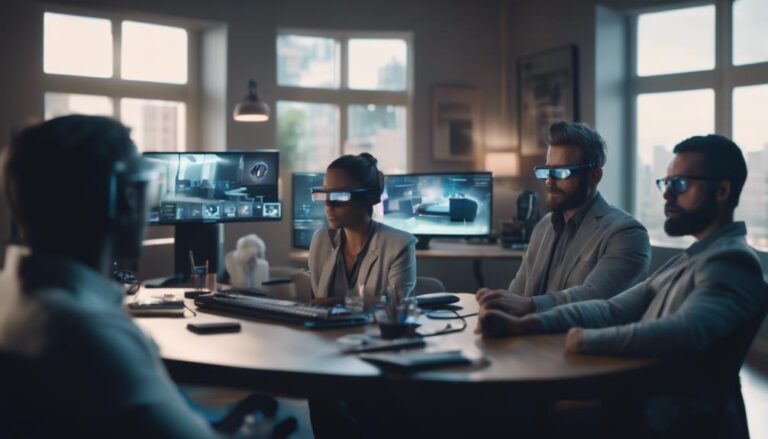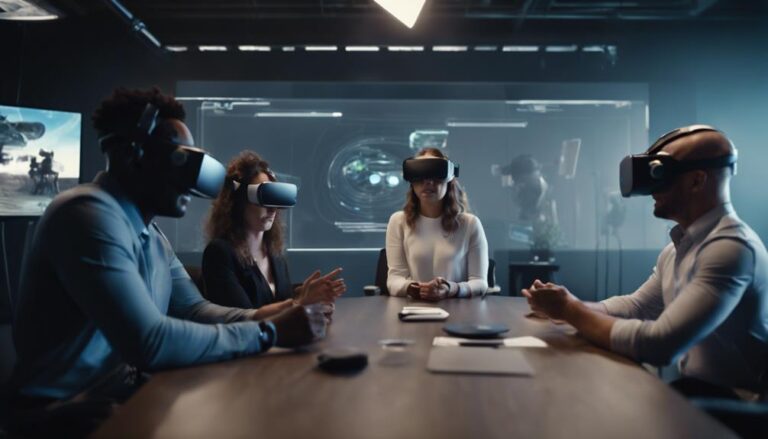Augmented Reality Applications for Remote Work Training and Support
Imagine a world where remote work training is no longer limited by physical constraints but enhanced by cutting-edge technology. Augmented Reality (AR) applications are reshaping the way organizations equip their employees with essential skills and knowledge. By seamlessly blending virtual elements with real-world environments, AR offers a unique approach to training that is both engaging and effective. As you explore the possibilities of AR in remote work scenarios, you will discover the transformative impact it can have on learning outcomes and employee performance.
Key Takeaways
- Enhance engagement and interactivity in remote training through AR applications.
- Provide personalized learning experiences tailored to individual needs.
- Bridge physical gaps and facilitate seamless collaboration in remote work scenarios.
- Offer real-time feedback and interactive simulations for effective skill development.
- Address privacy and security concerns for successful implementation of AR technology.
Benefits of AR in Remote Training
Explore how augmented reality (AR) revolutionizes remote training by enhancing engagement, interactivity, and knowledge retention. AR offers a notable performance improvement and engagement boost compared to traditional training methods. By providing interactive simulations and real-time feedback, AR keeps learners actively involved, increasing their retention rates and overall understanding. This heightened engagement leads to a more effective learning experience, resulting in improved performance outcomes.
Moreover, AR in remote training brings about substantial cost savings and time efficiency. Traditional training methods often incur expenses related to travel, accommodation, and physical materials. With AR, these costs are markedly reduced as trainees can participate from anywhere, eliminating the need for physical resources and travel expenses. Additionally, AR allows for on-demand training sessions, enabling employees to access learning materials whenever convenient, thereby saving time and increasing productivity.
Immersive Learning Experiences
Immerse yourself in a world of interactive learning with augmented reality (AR) technology, transforming traditional training methods into engaging and effective experiences. Through virtual simulations, AR provides hands-on experiences that allow you to learn by doing, rather than just observing. This immersive approach enables you to practice skills in a realistic environment, enhancing retention and understanding.
One of the key benefits of immersive learning experiences in AR is the real-time feedback it offers. As you engage with the AR environment, you receive immediate responses to your actions, facilitating a continuous learning loop. This real-time feedback mechanism not only aids in correcting mistakes on the spot but also reinforces correct behaviors instantly.
Moreover, AR enables personalized learning experiences by adapting to your pace and preferences. By tailoring content and interactions based on individual needs, AR guarantees that you receive a customized learning journey that maximizes your understanding and skill development.
Embrace the future of training with AR, where immersive learning experiences revolutionize remote work education.
Interactive Skill Development
Enhance your skill development through dynamic interaction with augmented reality technology, fostering a hands-on learning experience tailored to your individual needs and pace.
Interactive skill development in augmented reality allows you to engage in realistic simulated scenarios where you can actively apply your knowledge and receive personalized feedback in real-time.
Through this cutting-edge technology, you can practice a wide range of tasks and procedures in a safe and controlled environment, boosting your confidence and competence without the fear of real-world consequences.
Overcoming Physical Distance Challenges
Innovative augmented reality applications offer a solution for bridging physical gaps and facilitating seamless collaboration in remote work training scenarios. Through virtual collaboration features, AR technology allows individuals from different locations to interact as if they were in in the same room. This capability is particularly valuable in addressing physical distance challenges, enabling team members to work together on tasks, receive instant feedback, and provide support in real time.
Virtual collaboration within AR platforms enhances the training experience by fostering a sense of togetherness among remote workers, despite being geographically dispersed. The ability to share insights, demonstrate skills, and troubleshoot issues collectively creates a dynamic and engaging learning environment. Additionally, the integration of real-time feedback mechanisms ensures that remote workers receive immediate guidance, corrections, and encouragement, enhancing the effectiveness of training programs.
Considerations for Implementation
When implementing augmented reality applications for remote work training, careful planning and strategic considerations are paramount for successful integration. One of the primary challenges in implementation is ensuring seamless technology integration across various devices and platforms. Compatibility issues may arise, requiring thorough testing and troubleshooting to guarantee a smooth user experience.
Another consideration is the need for adequate training and support for employees who'll be utilizing the augmented reality tools. Providing detailed guidance on how to interact with the technology effectively is vital for maximizing its benefits and ensuring successful adoption.
Furthermore, addressing privacy and security concerns is essential during implementation. As remote work often involves sensitive information, ensuring that the augmented reality applications comply with data protection regulations is imperative to safeguarding company and user data.
Future Trends in Remote AR Training
Embracing cutting-edge technology, the future of remote AR training holds exciting potential for transforming the way employees learn and adapt to new work environments. One key trend on the horizon is AR collaboration, enabling teams to work together seamlessly across different locations. This feature facilitates real-time interaction and knowledge sharing, fostering a sense of togetherness despite physical distances.
Performance tracking is another essential aspect that future remote AR training will focus on. By leveraging AR technology, companies can gather detailed data on employee progress and skill development, enabling personalized learning paths and targeted feedback. This data-driven approach enhances training effectiveness and ensures that employees are meeting their learning objectives.
Furthermore, the integration of remote mentorship and virtual simulations will be pivotal in shaping the future of AR training. These tools will provide employees with hands-on guidance from experts and immersive experiences that simulate real-world scenarios, enhancing their learning outcomes and overall performance.
As organizations continue to adopt remote work models, these trends in remote AR training will play an important role in upskilling and empowering employees for success in the digital age.
Conclusion
To sum up, AR applications have truly revolutionized remote work training and support, offering a euphoric blend of immersive experiences, interactive learning, and virtual togetherness.
The future of remote AR training looks bright, with endless possibilities for enhancing skills and bridging physical gaps.
So, embrace the AR journey and let the virtual world guide you towards success in the domain of remote work.







